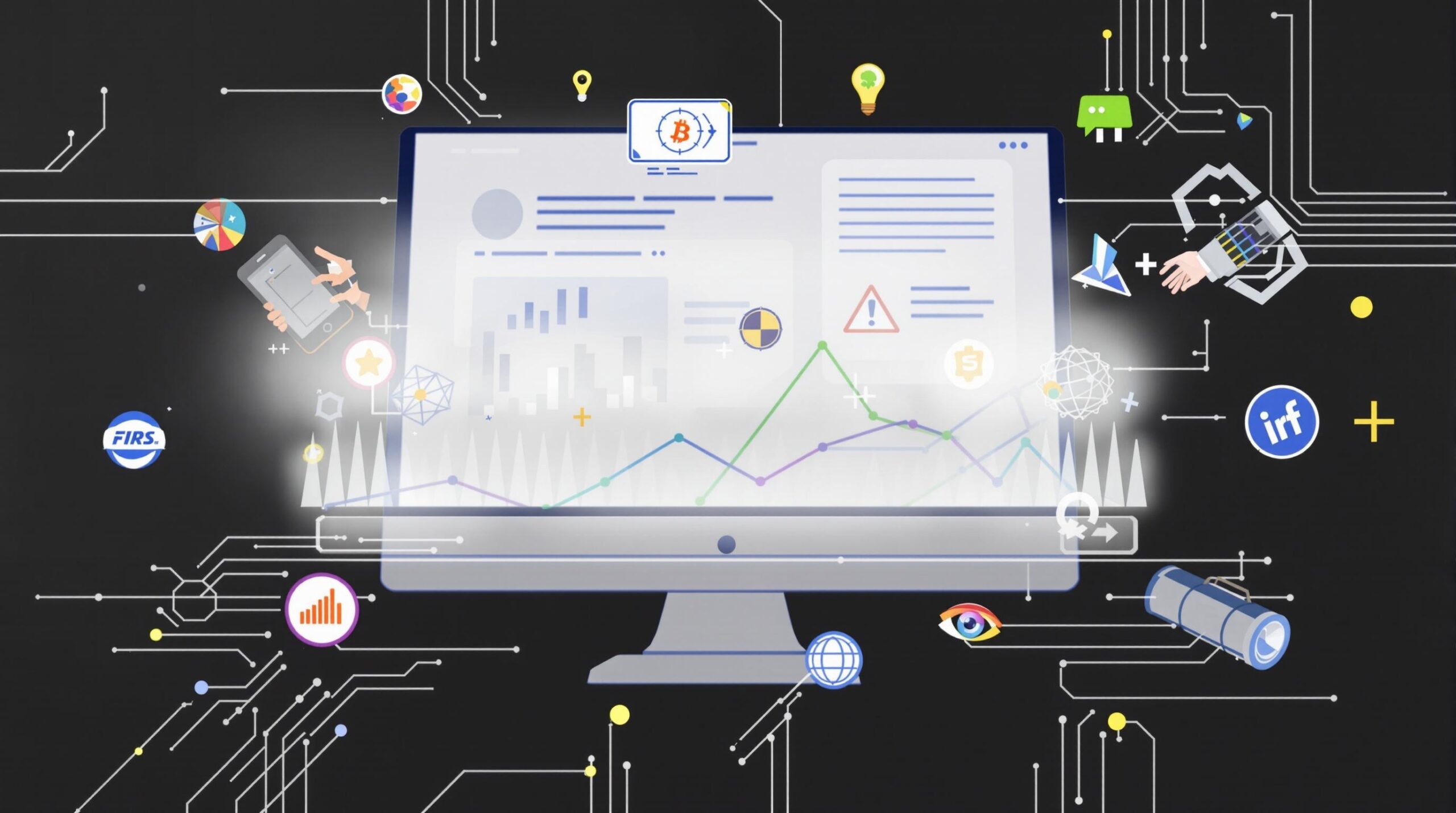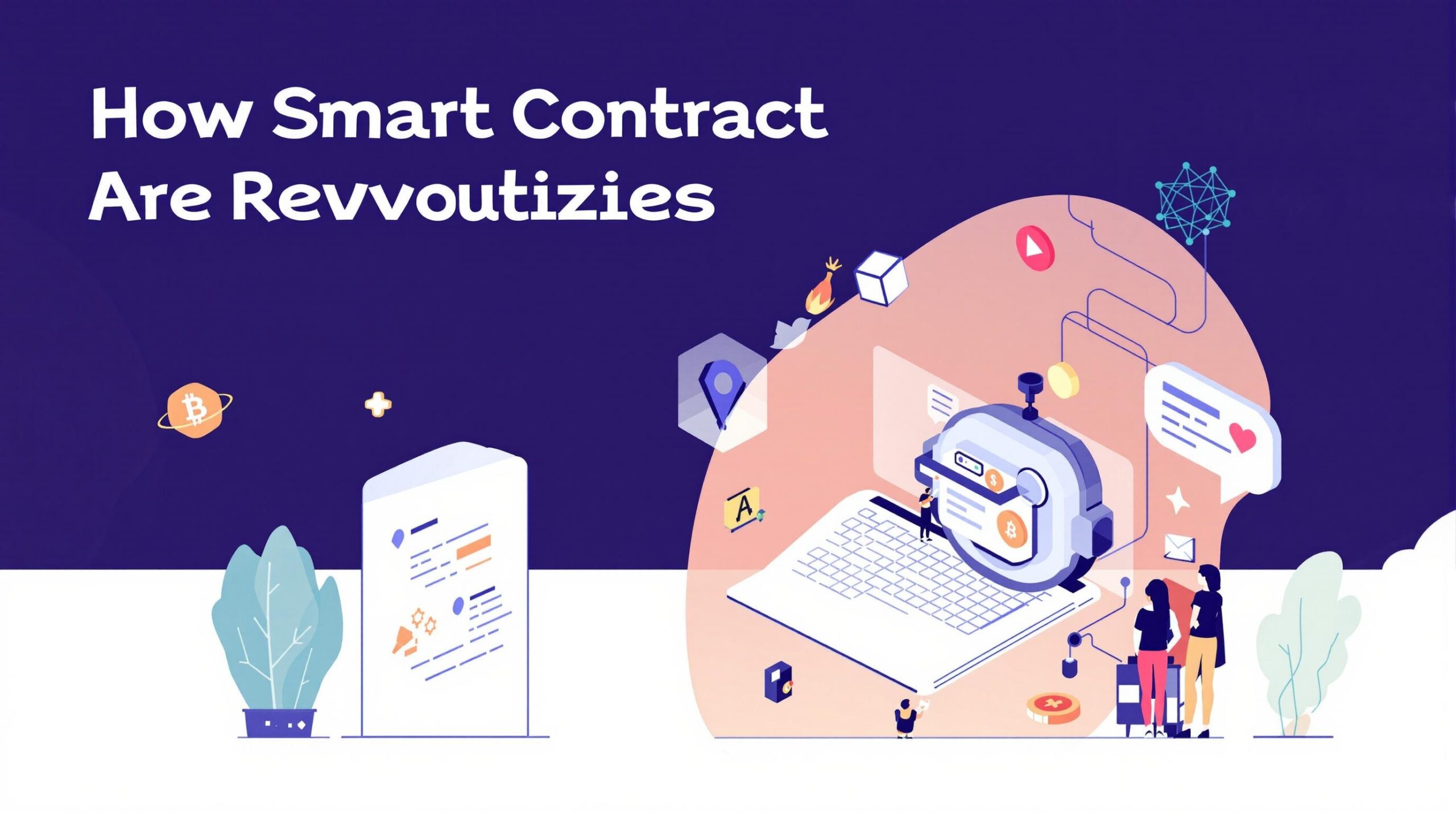Understanding Smart Contracts
Ever wondered how businesses can streamline operations and ensure seamless transactions without the hassle of traditional paperwork and intermediaries? Enter smart contracts—a technological marvel revolutionizing business automation. But what exactly are smart contracts?
What is a smart contract? A smart contract is a self-executing contract with the terms of the agreement directly written into lines of code. These contracts operate on blockchain technology, making them secure, transparent, and tamper-proof.
The Mechanism Behind Smart Contracts
Smart contracts automate processes and reduce manual intervention by using predetermined conditions coded in blockchain networks like Ethereum. But what makes them special? It’s their ability to execute actions such as payments once these conditions are met, without the need for a middleman.
Imagine running a business with the assurance that transactions will be executed automatically once agreed conditions are satisfied. Sounds like a game changer, right? Here’s how it works:
- Decentralization: Smart contracts run on decentralized networks like blockchain, eliminating central authority control and providing enhanced security and transparency.
- Autonomy: They operate independently once deployed, following the “set-and-forget” principle that minimizes human error and management costs.
- Trust and Security: Due to their immutable nature, they enhance trust among participating parties as the coded terms cannot be altered.
“Your transactions are secure, transparent, and as simple as setting conditions and letting the code do the rest.”—Smart contracts make business operations seamless and dependable.
Benefits of Smart Contracts in Business Automation
Smart contracts are proving indispensable in automating routine business tasks. Why is this important? Here are some compelling benefits smart contracts offer for business automation:
| Benefit | Explanation |
|---|---|
| Cost Efficiency | By eliminating intermediaries and reducing administrative costs, businesses save valuable resources. |
| Speed | Automating processes reduces transaction times significantly, boosting productivity. |
| Accuracy | Smart contracts minimize errors associated with manual handling, ensuring precise implementations of agreements. |
Real-World Applications of Smart Contracts
How are smart contracts transforming industries around the globe? Their versatility spans across many sectors, creating transformative impacts such as:
- Supply Chain Management: Smart contracts enhance transparency and efficiency in supply chain processes by automatically updating records and tracking goods.
- Insurance: Insurers use smart contracts to automate claims processing, ensuring swift and error-free settlements.
- Real Estate: By automating ownership transfers and escrow services, they simplify real estate dealings, making them quicker and cheaper.
These applications demonstrate the profound potential of smart contracts in streamlining operations and enhancing efficiency.
Smart contracts automate and validate transactions that are reliable, cost-effective, and secure. Imagine a future where business processes unfold error-free without any oversight. That’s the power of smart contracts.
Challenges and Future Prospects
While the advantages are significant, smart contracts face certain challenges, especially in emerging African markets. Infrastructure gaps, regulatory hurdles, and digital literacy levels can pose barriers to widespread adoption. However, companies like Jara are at the forefront, leveraging blockchain technology to bridge these divides.
Jara’s ecosystem is a prime example of how smart contracts can usher in Africa’s digital transformation. The $JARA token plays a pivotal role in facilitating cross-border transactions and enabling economic empowerment throughout the continent. With strategic partnerships and regulatory backing, Jara is paving the way for robust and equitable blockchain applications.
Read more about Jara and Africa’s digital asset revolution.
In conclusion, smart contracts are not merely an innovation; they are a revolution waiting to reshape the landscape of business automation. Businesses that embrace this technology can look forward to unparalleled efficiency, cost savings, and a transformative competitive edge.
Types of Personal Injury Claims
Personal injury claims can arise from a variety of situations. Understanding the different types can help you determine the best course of action if you’ve experienced an incident. Here are some of the most common:
- Car Accidents: These are among the most common causes of personal injury claims. Victims can suffer from various injuries, and establishing fault is critical.
- Slip and Fall: Property owners have a duty to maintain safe premises. When they fail to do so, slip and fall accidents may occur, leading to possible claims.
- Medical Malpractice: This occurs when healthcare providers fail to meet the standard of care, resulting in injury or harm to the patient.
- Product Liability: If a defective product causes injury, the manufacturer, distributor, or retailer could be held liable.
Important Reminder: No two personal injury claims are alike. Each case depends on the specifics of the incident and the applicable laws.
Understanding Negligence in Personal Injury Cases
Negligence plays a crucial role in personal injury cases. To establish negligence, you must prove:
- Duty of Care: The defendant had a legal obligation to ensure your safety.
- Breach of Duty: The defendant failed to uphold their duty of care by acting, or failing to act, as a reasonable person would.
- Causation: The breach of duty directly caused your injury.
- Damages: You suffered actual damages, such as medical bills or lost wages.
Understanding these elements can be complex, which is why a seasoned attorney can be invaluable in building your case.
The Statute of Limitations
The statute of limitations is the deadline for filing a personal injury lawsuit. Missing this deadline can result in losing your right to pursue compensation. Here’s a quick overview of typical statutes:
| Type of Claim | Typical Time Limit | Notes |
|---|---|---|
| Car Accidents | 2-3 Years | Timeframes vary by state. |
| Medical Malpractice | 1-3 Years | Special rules may apply. |
| Product Liability | 2-4 Years | Dependent on product type and state. |
Consulting with a legal professional promptly is crucial to ensure you don’t miss these deadlines.
Critical Warning: Don’t delay! Understanding your local laws surrounding time limits is vital to preserving your claim.
Why Hire a Personal Injury Attorney?
Hiring a personal injury lawyer can make a significant difference in the outcome of your case. Here’s why:
- Experience: Attorneys have the knowledge to navigate complex legal systems and policies, ensuring your rights are protected.
- Negotiation Skills: Lawyers can effectively negotiate with insurance companies to secure a fair settlement.
- Evidence Gathering: Collecting reliable evidence and documentation is crucial for building a solid case. An attorney knows where to look.
- No Upfront Costs: Many work on a contingency basis, meaning they only get paid if you win your case.
Choosing the right attorney can significantly impact the success of your claim. Consider their experience, reputation, and approachability.
Steps to Take After an Injury
Knowing what steps to take immediately after an injury can help protect your rights and strengthen your case:
- Seek Medical Attention: Your health should be the priority. Documenting injuries with medical records is also critical for your case.
- Report the Incident: Whether it’s a car accident or a workplace injury, report it to the appropriate authorities.
- Gather Evidence: Take photos, gather witness statements, and collect any other relevant evidence.
- Contact an Attorney: Getting legal advice early can provide guidance on the best course of action.
Client Testimonial: “The team at [Law Firm] didn’t just handle my claim—they guided me through every step. Their support was priceless.”
Potential Compensation in Personal Injury Cases
You may be entitled to various types of compensation, such as:
- Medical Expenses: Includes reimbursement for current and future medical care related to the injury.
- Lost Wages: Compensation for time missed from work and future earning potential.
- Pain and Suffering: Non-economic damages for physical and emotional distress.
- Property Damage: Repair or replacement costs for any property damaged during the incident.
An experienced attorney can help assess your situation and work towards obtaining the full compensation you deserve.

Protecting Your Rights in a Car Accident Claim
Understanding Types of Car Accidents
Car accidents can happen in a split second, yet they can have long-lasting effects on your life. Understanding the variety of accidents can help underscore the complexity of claims and the diversity of compensation options.
- Rear-End Collisions: Often caused by following too closely or sudden stops, these are among the most common and tend to result in neck injuries.
- Side-Impact Crashes: Also known as T-bone accidents, these occur when one vehicle crashes into the side of another, typically at intersections.
- Head-On Collisions: Generally the most severe, these involve two vehicles colliding front-to-front, often leading to serious injuries.
- Single Vehicle Accidents: Involves only one vehicle, often due to hitting an obstacle, rolling over, or losing control due to weather or mechanical failure.
It’s crucial to understand the type of accident you were involved in, as this shapes the legal strategy for your claim and impacts potential compensation.
Steps to Take After a Car Accident
In the aftermath of a collision, your actions can significantly influence your legal rights and the strength of your claim. Handling the situation methodically and strategically is key:
- Ensure Safety: First and foremost, check for injuries. Call emergency services immediately if anyone is harmed.
- Document the Scene: Utilize your phone to take pictures of the vehicles, injuries, road conditions, and any relevant traffic signs.
- Gather Witness Information: Collect contact details from any bystanders who witnessed the accident.
- Exchange Information: Share contact and insurance information with the other driver; staying calm and courteous is essential.
- Report to Authorities: Even in minor accidents, filing a police report can provide crucial documentation for your claim.
Remember, what you do immediately after a car accident can significantly influence your legal case and compensation.
Determining Liability in Car Accidents
Identifying the liable party in a car accident is fundamental to a successful claim. This hinges on establishing negligence, which is typically broken down into these four components:
- Duty of Care: Establishing that the defendant had a legal obligation to act with care towards you.
- Breach of Duty: Showing that the defendant violated this duty through their actions or lack thereof.
- Causation: Demonstrating that this breach directly caused the accident and resulting injuries.
- Damages: Proving that you suffered actual harm (physical, emotional, or financial) as a result of the accident.
Successfully proving negligence can secure your rightful compensation, either through an insurance settlement or a court judgment.
Common Missteps After an Accident
Avoiding typical errors after your accident can preserve the integrity of your claim:
- Admitting Fault: Refrain from discussing fault at the scene; even a simple apology can be misconstrued in legal contexts.
- Neglecting Medical Attention: Being evaluated by a healthcare professional post-accident is vital, even if you’re symptom-free at first.
- Skipping Legal Advice: A seasoned attorney knows the ins and outs and can protect you from lowball settlement offers.
- Overlooking Documentation: Failing to maintain detailed records of medical visits, repair estimates, and conversations can weaken your case.
- Delaying Your Claim: Timing is critical; statutes of limitations apply, affecting your ability to file and succeed with your claim.
Insurance Companies & Settlement Negotiation
Dealing with insurance companies can be as challenging as the accident itself. These businesses prioritize profit, which means minimizing payouts whenever possible. Key things to bear in mind:
- Initial Offers: Don’t accept the first settlement offer without reviewing its adequacy concerning your total damages.
- Detailed Documentation: Providing comprehensive records of injuries, treatments, and associated costs strengthens your negotiation position.
- Legal Representation: An attorney possesses negotiation expertise and can counter insurance tactics to ensure a fair settlement.
Engaging our law firm ensures you are not just another case number to insurance companies. We focus on obtaining the best possible outcome for you.
Why Choose Us for Your Car Accident Case?
Our commitment is anchored in going above and beyond to uplift your situation after an accident. Why should you consider our firm?
“Your Voice, Our Mission” – we champion your rights with the tenacity and dedication that has earned us the trust of our community members.
- Personalized Attention: We see each case as unique, giving it the care and individual focus it deserves.
- Extensive Experience: Years of experience enable us to master the nuances of car accident claims, always prioritizing your best interests.
- No Upfront Fees: Our contingency fee structure means you pay us nothing unless we win your case.
- Client Testimonials: Our past clients highlight our compassionate approach and dedicated service, pivotal in restoring their peace of mind.
Understanding Personal Injury Law: Your Guide to Legal Rights
“Empowering individuals through a clear understanding of their rights is the cornerstone of effective legal assistance.” – Our Law Firm’s Motto
What is Personal Injury Law?
Have you ever wondered what happens when someone gets hurt due to someone else’s negligence? That’s where personal injury law comes into play. It’s a branch of civil law that helps individuals receive compensation for injuries they’ve suffered because of another party’s actions.
Types of Personal Injury Cases
Personal injury law covers a wide range of scenarios, but here are the most common types:
- Car Accidents: Involving injuries due to another driver’s negligence on the road.
- Slip and Falls: Occurring when someone slips or trips due to hazards like wet floors or uneven surfaces.
- Medical Malpractice: When healthcare professionals fail to provide the standard care, resulting in harm to patients.
- Product Liability: When defective products cause injury to consumers.
- Workplace Injuries: Covering accidents or health issues sustained at work.
The Legal Process of a Personal Injury Claim
Ever wondered how a personal injury claim works from start to finish? Let’s break it down:
- Consultation: Get in touch with a personal injury attorney to discuss your case. It’s important because they will guide you through your rights and potential compensations.
- Investigation: Your attorney gathers all necessary evidence, which may include medical records, witness statements, and photos of the accident scene.
- Filing a Claim: Once the investigation is complete, your attorney will file a claim against the responsible party or their insurance company.
- Negotiation: Often, cases are resolved through negotiation with the insurance company. Your lawyer will handle these discussions to ensure you get a fair settlement.
- Litigation: If a fair settlement isn’t possible, the case may go to trial where your attorney will represent you in court.
Why Hire a Personal Injury Lawyer?
You might be thinking, “Do I really need a lawyer?” Let’s look at the benefits:
- Expertise and Knowledge: Personal injury lawyers have extensive knowledge of the law and can navigate the legal process efficiently.
- Investigation and Evidence Gathering: They know how to collect and present the evidence required to support your case effectively.
- Negotiation Skills: Lawyers are skilled negotiators and can often secure better compensation than individuals can on their own.
- Peace of Mind: Having a lawyer means you can focus on your recovery while they handle all legal aspects of your case.
Earning maximum compensation is not just about the money; it’s about getting your life back on track after an unfortunate event.
Common Challenges in Personal Injury Cases
Working through a personal injury case can be complicated, with several obstacles that could arise:
- Proving Liability: Demonstrating the other party’s fault can sometimes be difficult without clear evidence.
- Complex Medical Evidence: Understanding medical reports and terminology can be challenging without expertise.
- Insurance Company Tactics: Insurers may use various tactics to reduce or deny claims, which can be overwhelming for claimants.
- Statute of Limitations: Missing the deadline to file a lawsuit can completely bar your claim, making timing crucial.
FAQ: Frequently Asked Questions
| Question | Answer |
|---|---|
| What should I do immediately after an accident? | Seek medical attention, report the accident to authorities, gather evidence if possible, and contact a personal injury lawyer. |
| How long does it take to resolve a personal injury case? | The timeline varies case by case. Some are resolved in months, while others may take years, especially if they go to trial. |
| What if I was partially at fault for my injury? | This depends on the state laws, but you may still recover damages if you’re less than 50% responsible under comparative negligence rules. |
| Can I afford a personal injury lawyer? | Most personal injury lawyers work on a contingency fee basis, meaning they only get paid if you win the case. |
“It’s never too soon to take action when your rights and well-being are on the line.” Contact our experienced legal team today!
How Our Firm Can Help You
We understand that dealing with an injury can be overwhelming. Our dedicated team of attorneys is here to offer you personalized support every step of the way. What sets us apart?
- Compassionate Approach: We listen to your story with empathy and respect, ensuring that your needs come first.
- Comprehensive Support: From medical referrals to financial advice, we offer a holistic approach to your recovery.
- Proven Track Record: Our success in securing favorable settlements and verdicts speaks for our dedication and expertise.
Conclusion
Understanding personal injury law is essential for protecting your rights when an accident happens. Whether it’s a minor slip or a serious car accident, knowing the process and having the right legal support can make all the difference. If you’re facing a legal challenge and need expert assistance, our law firm is here to help you navigate the complexities of personal injury law with confidence.
This HTML content is designed for seamless integration into WordPress via Zapier, formatted for clarity and style consistency, and optimized for SEO and client engagement.

What is a Smart Contract in Business Automation?
Smart contracts in business automation refer to self-executing contracts with the terms of the agreement directly written into lines of code. They operate on blockchain technology, ensuring transparency and minimizing the need for intermediaries. This streamlines processes and reduces costs for businesses seeking automation solutions.
How Do Smart Contracts Minimize Errors in Business Operations?
Smart contracts minimize errors in business by automating tasks and reducing human intervention. Each transaction is verified and executed automatically once conditions are met, ensuring accuracy and efficiency. This reduces the risk of human error and enhances the reliability of business operations.
Can Smart Contracts in Business Replace Traditional Legal Agreements?
While smart contracts simplify and automate the execution of certain aspects of agreements, they do not completely replace traditional legal contracts. Smart contracts lack the flexibility and complexity required for dynamic legal scenarios and still depend on human oversight, especially in resolving disputes.
What Industries Benefit Most from Smart Contract Automation?
Industries such as supply chain management, finance, and real estate benefit significantly from smart contract automation. These sectors utilize smart contracts for automating transactions, enhancing transparency, and reducing costs associated with manual processes, leading to more efficient and trustworthy operations.

Additional Practice Areas We Serve
Explore our extensive range of services to see how we address various aspects of business automation and legal innovation through smart contracts. Check out the related practice areas below:
Discover What Our Smart Contracts & Automation Clients Are Saying
Our dedication to excellence in Smart Contracts & Automation is evident in every case we undertake. The positive feedback from our clients is a testament to the hard work and dedication we consistently deliver.

Embrace the Future of Business Automation with Jara
As businesses navigate the digital age, harnessing the power of smart contracts can be transformative. At Jara, we specialize in providing cutting-edge solutions to enhance your business operations through automation. Are you ready to leverage technology for growth and efficiency?
“Your Voice, Our Mission” – we champion your rights with the tenacity and dedication that defines our practice.
Download the Jara app today to begin your journey towards seamless business automation:
- Android Users: Get Jara on Google Play
- iPhone Users: Download Jara from the App Store
Awards and Recognitions
Our excellence in smart contracts and automation has been highlighted by several prestigious organizations:
- Listed among the “Top Blockchain Service Providers” for 2023 by Clutch.co – Our innovative solutions stood out for their ability to streamline business processes.
- Recognized in the “Leading Smart Contract Firms” list by The Manifest – A testament to our pioneering approach in integrating technology with business needs.
- Featured among the “Best Fintech Innovators” for 2023 on GoodFirms – Acknowledging our contribution to financial technology and automation.
- Named one of the “Top Automation Experts” by TechTimes – Highlighting our expertise and creativity in implementing automation solutions.
- Positioned in the “Premier Legal Tech Companies” list by LegalTech News – Celebrating our role in revolutionizing the legal tech space.
Don’t just take our word for it, experience the revolution in business automation for yourself. Reach out to us at [email protected] and let’s explore how Jara can redefine your business strategy.
Chinyere “Chi” Nnadi Bio
Founder and CEO, Jara | Blockchain Business Automation Specialist
Content Reviewed by Chi Nnadi and his Content Team. Chi is an experienced entrepreneur dedicated to transforming Africa’s financial ecosystem through blockchain technology. As Founder and CEO of Jara, he builds enterprise-grade infrastructure converting illiquid African assets into globally accessible digital tokens. With his proprietary Layer-2 blockchain technology and expertise in blockchain business automation, Chi bridges the gap between global investors and Africa’s growing digital asset market.

















